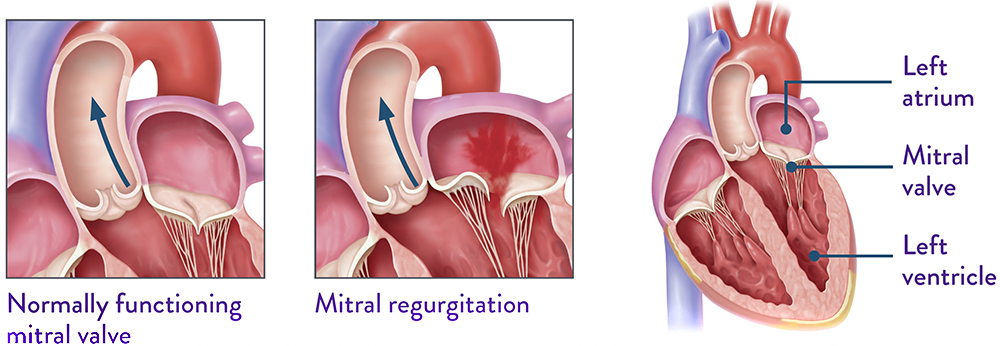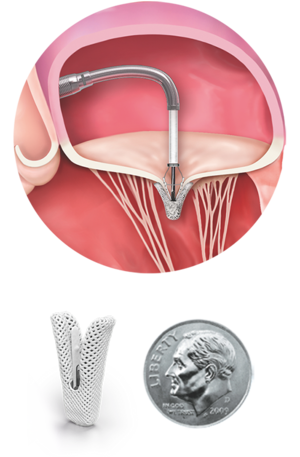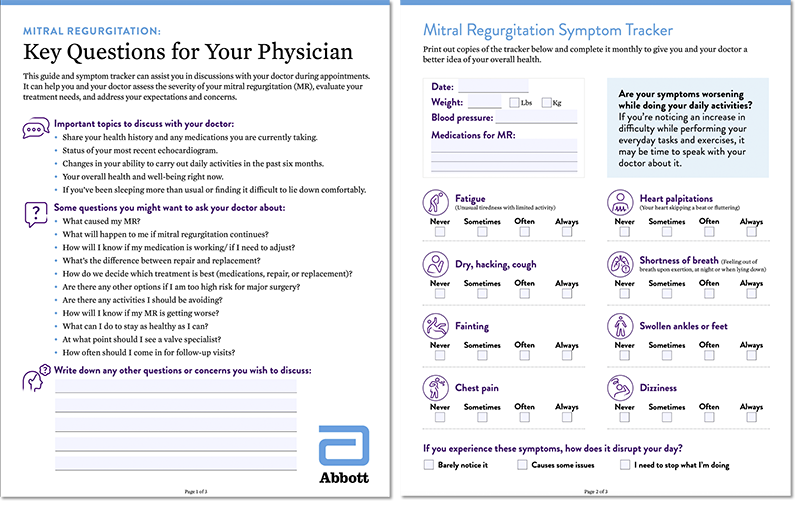REPAIR YOUR LEAKY
MITRAL VALVE.
RECLAIM YOUR LIFE.
Think heart-related problems are
just something you have to live with?
Think again.
DISCUSS ALL TREATMENT OPTIONS WITH YOUR DOCTOR
Your doctor can describe the risks and benefits and help you decide which option is right for you.
Why have 200,000+ people chosen MitraClip™ Therapy?

STAY OUT OF THE HOSPITAL
| 47% | Relative Risk reduction in heart failure hospitalization at 5 years, compared to medication alone.1 |

SAVESLIVES
| 28% | Relative Risk reduction in mortality, compared to medication alone.1 |

PATIENTS FEEL BETTER
| 2.5x | More likely to experience a large improvement of quality of life with MitraClip™, compared to medication alone.2 |

EXCEPTIONALLY SAFE
| 99% | Freedom from device-specific complications at 5 years.1 |
*This testimonial relates an account of an individual’s response to the treatment. This patient’s account is genuine, typical and documented. However, it does not provide any indication, guide, warranty or guarantee as to the response other persons may have to the treatment. Responses to the treatment discussed can and do vary and are specific to the individual patient.
What is Mitral Regurgitation?
Mitral regurgitation (MR) is a condition affecting the mitral valve and occurs when the mitral valve fails to close completely and blood leaks backward inside your heart. MR can get worse over time and really impact your quality of life. It weakens your ability to complete simple day-to-day tasks.

What does MR feel like?
Symptoms of a leaky mitral valve include:3






If left untreated, up to 57% of people with a leaky mitral valve may not survive 1 year.6
What is MitraClip™ Therapy?
For many patients with MR, medications may not be enough. And, in many cases, surgery is also not a viable option for those with heart failure and a leaky heart valve. For some patients, MitraClip therapy can be an option.
MitraClip™ Transcatheter Edge-to-Edge Repair is a simple and safe procedure to fix your mitral valve, without open-heart surgery.
During the procedure, doctors access your heart valve with a thin tube (called a catheter) that is guided through a vein in your leg. A small implant is attached to the leaflets of your mitral valve valve to help it close more completely, helping to restore normal blood flow.
The procedure can last 1 to 3 hours, and patients are typically back at home the next day. Most patients experience improvement in their symptoms and quality of life very soon after the procedure.

The MitraClip™ Implant is about the size of a dime.
Ready to discuss with a doctor?
If your MR symptoms are starting to interrupt your daily life, it may be time to talk to your doctor about repairing your leaky heart valve.
Print out this discussion guide to track your symptoms and review common questions with your doctor at your next appointment.


FAQ
- What is a leaky valve/mitral regurgitation?
Leaky valve (technically called mitral regurgitation) is a common condition that affects one of the valves in your heart most commonly—the mitral valve.
About 1 in 10 people aged 75 and older have moderate or severe mitral regurgitation.1
To determine if you have mitral regurgitation and to assess the function and condition of your heart and mitral valve, your cardiologist may perform diagnostic evaluations, including:- Taking a chest x-ray and/or ultrasound to see the size and shape of your heart and evaluate your lungs
- Evaluating you for symptoms of congestive heart failure (such as shortness of breath or fatigue) or other related heart conditions
Find a MitraClip™ center near you, or download a discussion guide.
- How will I know if MitraClip™ is right for me?
You will be evaluated by a specially trained heart team, including an interventional cardiologist and a clinical cardiologist, who will review your medical history and perform a variety of tests. There are several factors they will take into consideration when deciding whether or not you are eligible for open-heart surgery and therefore a possible candidate for MitraClip™ therapy, such as your age, frailty, and the condition of your heart.
Your doctor may decide that the MitraClip™ procedure is not appropriate for you if you:- Cannot tolerate medications that thin the blood or prevent blood clots from forming
- Have an active infection or inflammation of the mitral valve
- Have mitral valve disease as a result of rheumatic fever
- Have a blood clot in your heart or in the vessels that carry blood from the lower body to the heart
Your doctor will discuss with you whether any of these issues will prevent you from having the MitraClip™ procedure. An evaluation of your heart will also confirm whether your heart valve anatomy allows for successful placement of the device.
Find a MitraClip™ center near you, or download a discussion guide.
- What is MitraClip™ made of?
The MitraClip™ device is a small metal clip covered with a polyester fabric that is implanted on your mitral valve. The clip is inserted through a catheter, without the need to temporarily stop your heart. There can be up to 4 different clip sizes used to tailor your clip size to your valve.
Find a MitraClip™ center near you, or download a discussion guide.
- What are the benefits of the MitraClip™ procedure?
More than 200,000 patients have been treated with the MitraClip™ device worldwide.* More than 80,000 of these patients have been followed through multiple studies and registries.
The results are impressive:
SAVES LIVES: 28% reduction in relative risk of mortality.1
FEWER HOSPITALIZATIONS: 47% relative risk reduction in heart failure hospitalization.1
HELPS PATIENTS FEEL BETTER: 2.5x more likely to experience a large improvement in quality of life.2
And it’s proven to be safe:
MINIMALLY INVASIVE: This procedure does not require opening the chest or temporarily stopping the heart.
EXCEPTIONALLY SAFE: 99% freedom from device-specific complications at 5 years.1
SHORT HOSPITAL STAY: Patients are usually released from the hospital within 1 to 3 days, significantly less time compared to surgery.7
Patients who were studied 5 years after the MitraClip™ procedure continued to experience improvement in their heart function, quality of life, and ability to perform day-to-day tasks.Find a MitraClip™ center near you, or download a discussion guide.
- How do I prepare for the MitraClip™ procedure?
In the days before your procedure, it is important that you:
- Take all of your prescribed medications
- Tell your doctor if you are taking any other medications
- Make sure your doctor knows of any allergies you have
- Follow all instructions given to you by your doctor or nurse
Learn more about how the MitraClip™ procedure works.
Find a MitraClip™ center near you, or download a discussion guide.
- How soon after having the MitraClip™ procedure will I start to feel the effects?
Clinical data from patients who underwent the MitraClip™ procedure demonstrate an immediate reduction of mitral regurgitation. You should experience a significant improvement in your leaky valve–related symptoms and quality of life soon after your procedure. It is important to discuss what to expect following the procedure with your transcatheter mitral valve repair (TMVr) heart team.
Find a MitraClip™ center near you, or download a discussion guide.
- Will I be able to tell that the MitraClip™ device is in my heart?
No, you will not be able to feel the implant.
Find a MitraClip™ center near you, or download a discussion guide.
- Can I have an MRI if I have a MitraClip™ device?
It is possible that you may be able to have aa magnetic resonance imaging (MRI) scan performed. However, you must inform your MRI facility and technician that you have a MitraClip™ device. After the procedure you will be given an implant card that describes what types of MRIs you will be able to receive. If the test can be performed, they may need to make certain adjustments to ensure your safety.
Find a MitraClip™ center near you, or download a discussion guide.
- Will I see improvements with MitraClip™ over medication alone?
In a clinical study called COAPT™, heart failure patients with mitral regurgitation who were treated with MitraClip™ and medication experienced improvements over those treated with medication alone.
The COAPT trial demonstrated that MitraClip™:- SAVES LIVES: 28% reduction in relative risk of mortality.1
FEWER HOSPITALIZATIONS: 47% relative risk reduction in heart failure hospitalization.1 - HELPS PATIENTS FEEL BETTER: 2.5x more likely to experience a large improvement in quality of life.2
- EXCEPTIONALLY SAFE: 99% freedom from device-specific complications at 5 years.1
Find a MitraClip™ center near you, or download a discussion guide.
- SAVES LIVES: 28% reduction in relative risk of mortality.1
- How do I find a MitraClip™ center near me?
Stay updated about MitraClip™ Therapy
IMPORTANT SAFETY INFORMATION
What is MitraClip™ Therapy approved for?
Available by prescription only.
MitraClip therapy is a minimally invasive procedure approved for treating patients with clinically significant mitral regurgitation due to either (a) a deteriorated mitral valve in patients who are deemed to be at prohibitive risk for surgery, or (b) mitral valve in patients who have heart failure and reduced pumping function who remain symptomatic despite maximally tolerated medications to treat their heart failure.
Patients should work with their doctor and a multidisciplinary heart team, which may include a heart surgeon and cardiologist with experience treating heart failure, to confirm their surgical risk and to ensure that they are on the optimal medications. The heart team will determine if transcatheter edge-to-edge valve repair is clinically appropriate, and if the patient meets the indications for the MitraClip procedure.
Who should not have the MitraClip Procedure?
Patients that have any of the following conditions should not have the MitraClip Procedure: inability to tolerate or are allergic or hypersensitive to anti-coagulants, anti-platelet therapies, nickel, titanium, cobalt, chromium, polyester, or contrast dye; have inflammation or rheumatic disease of the valve; have blood clots inside the heart or blood vessels (inferior vena cava, femoral vein), or active endocarditis or other active infection of the valve or have mitral or tricuspid valve anatomy which is deemed not suitable for repair with MitraClip.
What are the possible complications associated with the MitraClip Procedure?
As with any medical procedure, there is a possibility of complications. The most serious complications of the MitraClip procedure includes, but are not limited to: death, stroke (a condition in which decreased blood flow to the brain can result in brain damage and may cause severe disability), transient ischemic attack (stroke symptoms that last only a few minutes), major vascular complications (damage to a major blood vessel that may require emergency surgery or urgent cardiac surgery), life threatening bleeding event (a major bleeding event that requires a blood transfusion). For additional potential risks and complications, please consult with your physician or heart team.
Talk to your doctor to learn more about the risks associated with MitraClip Therapy and ask for the detailed Important Safety Information if you'd like to review the full list of complications.
Photo(s) on file at Abbott.
Unless otherwise specified, all product names appearing in this Internet site are trademarks owned by or licensed to Abbott, its subsidiaries or affiliates.
No use of any Abbott trademark, trade name, or trade dress in this site may be made without the prior written authorization of Abbott, except to identify the product or services of the company.
MAT-2010280 v6.0 | Item approved for U.S. use only
Stone GW. et al. Five-Year Follow-up after Transcatheter Repair of Secondary Mitral Regurgitation. N Engl J Med. March 5, 2023. DOI: 10.1056/NEJMOA2300213
Arnold SV et al. Health status after transcatheter mitral valve repair in heart failure and secondary mitral regurgitation. JACC Mar 2019, 25951; DOI: 10.1016/j.jacc.2019.02.010
Mayo Clinic. Mitral valve regurgitation. Accessed June 16, 2025. www.mayoclinic.org/diseases-conditions/mitral-valve-regurgitation/symptoms-causes/syc-20350178
Cleveland Clinic. Can a Cough Be Related to Heart Issues? May 5, 2022. Accessed June 16, 2025. https://health.clevelandclinic.org/persistent-cough-it-may-be-a-sign-of-heart-failure
Phoenix Heart | Vein | Vascular. 6 Symptoms of Mitral Regurgitation. October 6, 2022. Accessed June 16, 2025. https://phoenixheart.com/6-symptoms-of-mitral-regurgitation/
Cioffi G, Tarantini L, De Feo S, et al. Functional mitral regurgitation predicts 1-year mortality in elderly patients with systolic chronic heart failure. Eur J Heart Fail. 2005;7(7):1112-1117.
von Bardeleben, R. et. al. Real-World Outcomes of Fourth-Generation Mitral Transcatheter Repair 30-Day Results From EXPAND G4. JACC: Cardiovascular Interventions, 2023. Vol. 16. No. 12. doi.org/10.1016/j.jcin.2023.05.013

